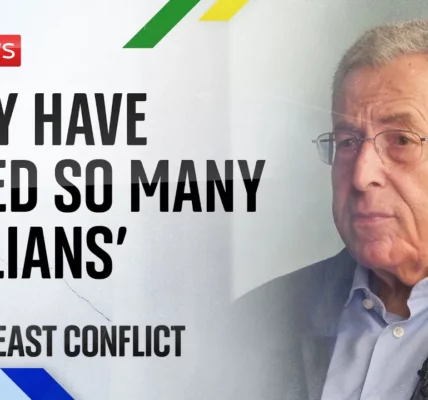Nighttime on the Front Line: Reports from Ukrainian Medics Amid the Conflict

This article provides a detailed overview of the current situation in Lebanon amidst escalating violence, including perspectives from Ukrainian medics on the front lines, humanitarian crises, and diplomatic efforts for peace.
Introduction
The ongoing conflict in Lebanon has reached alarming levels, with the recent escalation of violence leading to significant casualties and a growing humanitarian crisis. As the situation deteriorates, reports from the front lines illuminate the dire circumstances faced by civilians and military personnel alike. This article explores the current state of affairs, including the implications of military operations, the humanitarian impact, and the urgent call for international intervention and diplomatic solutions.
The Escalation of Conflict in Lebanon
Lebanon is currently experiencing unprecedented violence, with recent reports indicating that over 700 people have been killed, including women and children. The escalation began with intensified air strikes by Israeli forces, targeting over 2,000 locations in Lebanon. The Israeli Defense Forces (IDF) have indicated a potential ground invasion in response to ongoing missile attacks from Hezbollah.
Impact of Air Strikes
As air raid alerts sound every few minutes, the intensity of the bombardment has led to widespread panic and displacement among the Lebanese population. Key points include:
- Hundreds of thousands of people are fleeing their homes to escape the violence.
- Residential areas have been devastated, with entire blocks reduced to rubble.
- Emergency services are overwhelmed, struggling to keep pace with the influx of casualties.
Hezbollah’s Response
Hezbollah has vowed to retaliate against Israeli strikes, launching missiles towards Tel Aviv, further escalating tensions. Analysts suggest that while both sides are engaged in a dangerous game of brinkmanship, neither Hezbollah nor Iran desires a full-scale war, fearing catastrophic consequences.
The Humanitarian Crisis
The humanitarian situation in Lebanon is deteriorating rapidly. Hospitals are overwhelmed, and many civilians find themselves without basic necessities. Key statistics from reports include:
- Over 5,000 individuals injured, with a significant number being civilians.
- Many hospitals are struggling to function due to the influx of wounded and damage from air strikes.
- Displacement figures are alarming, with estimates indicating that nearly half a million people have been forced from their homes.
Challenges Faced by Civilians
Civilians in Lebanon are facing dire conditions, including a lack of food, water, and shelter. The government has reported a significant increase in displaced families seeking refuge in makeshift shelters, which are often inadequate and overcrowded.
International Response and Aid Efforts
Despite the urgent need for humanitarian assistance, international aid has been slow to materialize. Many refugees express frustration with the lack of support, highlighting the following issues:
- Inadequate supplies of food and medical resources in shelters.
- Limited access to safe drinking water and sanitation facilities.
- Overwhelmed local authorities struggling to provide basic services.
Military and Diplomatic Developments
As military tensions rise, diplomatic efforts have stalled, with world leaders calling for de-escalation. Key developments include:
The Role of International Leaders
World leaders, including President Zelensky of Ukraine, have emphasized the need for a united front against aggression. Diplomatic solutions remain elusive, and calls for peace are increasingly urgent.
Potential for Ground Invasion
The possibility of an Israeli ground invasion looms large, with military analysts suggesting that such an action could further destabilize the region. The risks associated with a ground offensive include:
- Increased civilian casualties and potential humanitarian disasters.
- Escalation of violence beyond Lebanon into neighboring countries.
- International backlash against Israel’s military operations.
Conclusion
The situation in Lebanon continues to evolve, with an urgent need for humanitarian assistance and diplomatic intervention. As violence escalates, the international community must prioritize peace efforts and support for affected civilians. It is imperative for world leaders to come together to de-escalate the conflict and address the humanitarian crisis head-on. For those looking to help, consider supporting organizations providing aid to civilians affected by the conflict.
“`




